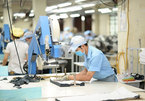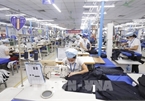Before HCM City imposed social distancing measures, Binh Dien wholesale market sold 1,500 tons of seafood and 1,000 tons of vegetables and fruits every day. Moc Mon wholesale market sold 5,000 pigs and 2,500 tons of vegetables per day, and Thu Duc wholesale market sold 4,000 tons of vegetables and fruits a day.
 |
|
Wholesale markets have temporarily closed when the Covid-19 outbreak occurred in HCM City.
|
These are three large wholesale markets that not only supply agricultural products to Ho Chi Minh City but many other provinces. The three wholesale markets temporarily closed when the Covid-19 outbreak occurred in HCM City.
After these markets were closed, supply of goods, mainly food and fresh food, for HCM City was in shortage while the supply chain was interrupted. The price for pigs and chickens in the southern province of Dong Nai has dropped below the cost level. According to the Vietnam Poultry Breeding Association, over 60 million poultry heads are unsalable. At the same time, millions of tons of fruits and vegetables cannot find outlets.
The Ministry of Agriculture and Rural Development set up a special working group in the South (working group 970) to take care of consumption of agricultural products when many wholesale markets had to close. The group’s report shows a more alarming situation. In August alone, up to 1.1 million tons of fruit and vegetables must be harvested in the southern region. The volume of unsold aquatic products is up to nearly 480,000 tons.
The Ministry of Agriculture and Rural Development and the Ministry of Industry and Trade have suggested that the People's Committee of Ho Chi Minh City reopen wholesale markets as soon as possible, or at least set up goods gathering and transshipment points at these wholesale markets.
Deputy Minister of Agriculture and Rural Development Tran Thanh Nam - head of working group 970 - said that he had received requests from more than 800 agricultural product suppliers, with the need to sell several to 1,000 tons of agricultural produce.
In the North, as soon as wholesale markets had infection cases and were forced to close, a working group to direct the production and consumption of agricultural products was established.
An expert in the field of agriculture said that, in an urgent situation, such working groups are necessary to connect supply and demand for agricultural products. But this is only a temporary solution because the authorities cannot keep connecting each order like this. This situation proves the important role of intermediaries like wholesale traders, agricultural product trading enterprises, and wholesale markets.
 |
|
In the North, as soon as wholesale markets had infection cases and were forced to close, a working group to direct the production and consumption of agricultural products was established.
|
“We will have to live with the pandemic for a long time. With millions of tons of agricultural and aquatic products harvested each month, in addition to the wholesale market, traders, cooperatives and businesses still need a place to exchange and buy goods… The most effective way is online wholesale markets, also known as a wholesale e-commerce platform (B2B)," said an expert.
In Vietnam, selling agricultural products on e-commerce platforms is increasingly popular. Eggs, vegetables, chickens and other items are sold on e-commerce floors. Most recently, farmers in Bac Giang and Hai Duong provinces successfully sold their lychees on e-commerce platforms. However, these products are sold on e-commerce platforms in the B2C (business-to-consumer) model, under which e-commerce platforms have to work directly with farmers.
Nguyen Kim Hung, Director of VIDEM Institute, said e-commerce is playing a huge role in global trade. In 2020, the total transaction value was about 1.7 trillion USD, including both B2B and B2C e-commerce. In Vietnam, the value was less than 16 billion USD and the main model is B2C.
Digitizing wholesalers
Besides wholesale markets, the model of e-commerce platforms specializing in the wholesale of agricultural products has become popular.
In India, Ninjacar is an e-commerce platform specializing in wholesale vegetables and fruits. Retailers can place orders through the app and product information will be transferred to the supplying farms.
Ninjacart uses technology to solve logistics and marketing issues, reduce middlemen, avoid price fluctuations, and waste and unfair trading practices. Ninjacart provides farmers with an app so that they can know the needs of the market to have suitable harvest plans.
Similarly, WayCool is a B2B e-commerce platform, specializing in purchasing fruits, milk and vegetables from farmers and supplying to hotels, restaurants, and retailers. After six years of operation, WayCool has earned annual revenue of up to 134 million USD.
In Kenya, Twiga is an online wholesale market for agricultural products. Farmers can register on this platform, then Twiga will evaluate the farm, and add it to the list of suppliers.
In Canada, FarmLead has a website and mobile application, connecting grain farmers with businesses and grain buyers. FarmLead charges very low commission for transactions on this platform.
 |
|
If there is a nationwide B2B wholesale trading floor for domestic agricultural products, the supply chain of agricultural products will not be disrupted, even in the time of an epidemic.
|
Tridge is an online platform for trading agricultural products in the Republic of Korea. Tridge provides an online trading platform for producers, growers, importers, and wholesalers to buy and sell agricultural products worldwide. Tridge also provides market trends and analysis on various aspects such as real-time wholesale market prices, production trends, production volume analysis, and suppliers.
In Vietnam, some online markets for agricultural products have been set up on social networking platforms. Some “markets” operate on a nationwide scale and some cover certain regions. Most of them are formed by individuals and operate under their own rules, and are not registered with or supervised by relevant agencies. These “markets” have tens of thousands or even hundreds of thousands of participants, which show the potential of B2B e-commerce for agricultural products in Vietnam.
In the southern province of Vinh Long, there is a provincial agricultural product trading floor in the B2B model which operates very effectively, with large transactions of dozens of tons of fruit.
If there is a nationwide B2B wholesale trading floor for domestic agricultural products, the supply chain of agricultural products will not be disrupted, even in the time of an epidemic.
Tam An - Duy Khanh

Enterprises at risk of falling out of global supply chains due to fourth outbreak
Although Vietnam has dealt with previous COVID-19 outbreak with spectacular success, it stands to lose some of its hard-earned gains if it cannot overcome the latest outbreak that has paralysed industries in the past couple of months.

COVID-19 threatens to break supply chains in the south
Supply chains in HCM City and the southern provinces are at great risk of snapping because many businesses have been forced to stop operating or...